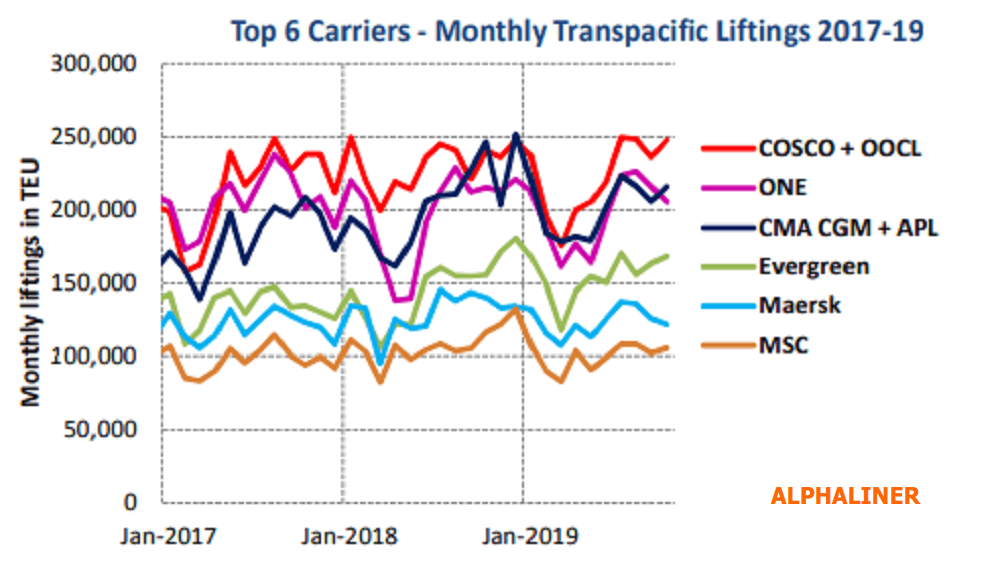The trans-Pacific container trade from Asia to North America is headed for its first annual decline in a decade, according to Alphaliner. Maersk, MSC, Hapag-Lloyd and COSCO are the carriers that have lost the most market share this year as volumes have contracted.
The France-based container shipping analyst predicts that the eastbound trans-Pacific container trade will register its first negative growth year since 2009, with a 2% drop expected for the full year 2019.
“While volume growth has remained marginally positive in the first three quarters of this year despite the ongoing trade war between China and the U.S., the fourth quarter is expected to register a significant decline, with no repeat of the frontloading by shippers to avoid higher import tariffs at the end of last year,” said its latest weekly report published earlier today (Nov. 13).
Latest trans-Pacific liftings data for the month of October showed a 3.9% drop. Alphaliner forecasts even larger year-on-year declines in November and December because the record volumes recorded in the last two months of 2018 – fueled by frontloading of cargo from China ahead of U.S. tariff deadlines – are not expected to be repeated this year.
Maersk, MSC, Hapag-Lloyd and COSCO have been the “main losers” in the fight for trans-Pacific market share this year, found the analyst. Their combined total eastbound liftings fell by between 3.1% to 4.5% in January-October 2019, compared to the same period of 2018. Niche carriers PIL and Wan Hai also recorded volume declines, while the rest of the main trans-Pacific carriers all posted increases.

“Evergreen was the main gainer on the trans-Pacific trade with liftings growing by 10.3%, along with the small South Korean carrier SM Line which grew volumes by 10.4%,” said the report. “ONE, which lost significant market in 2018 following the merger of K Line, NYK and MOL’s volumes in April 2018, saw liftings recover by 1.8% in the first 10 months of this year.”
Alphaliner’s reading of the trans-Pacific market in November contrasts starkly with predictions in the latest Global Port Tracker report by the National Retail Federation and Hackett Associates.
This forecast that box imports to U.S. retail ports in October would total 1.93 million twenty-foot equivalent units (TEUs), down 5.2% from last year’s record 2 million TEU. However, it anticipated that November volumes would total 1.96 million TEU, up 8.3% year-over-year and “tying last December and this July for the third-highest number of containers in a single month.”
Like Alphaliner, the Global Port Tracker then expects a decline in container imports to 1.78 million TEU in December, down 9.2% “from near-record numbers last year ahead of scheduled tariffs that were later postponed.”
As reported by FreightWaves’ Michael Angell, the Port of Los Angeles saw the biggest October drop in volumes in over two decades as the U.S.-China trade war wreaked havoc on the container trade.
The largest U.S. maritime gateway moved 770,189 TEU in October, a 19% decrease from October 2018. That rate is the steepest decline for October in 24 years of available monthly statistics. Since 1995, October container volume handling managed to show an average 6.6% yearly rise.
Alphaliner said that for the first 10 months of 2019, total trans-Pacific volumes reached 13.15 million TEU, growing by just 0.02% compared to the same period of 2018.
“The negative momentum is mirrored in the latest container throughput numbers reported for U.S. ports,” said the analyst.
“On the U.S. West Coast, Los Angeles, Long Beach and Oakland recorded a combined drop of -12.0% in total container throughput in October, with inbound laden containers falling by -13.2% while outbound laden containers were down by -4.9%.”
The main U.S. East Coast ports have not yet reported their October throughput but Alphaliner expects them to post reduced year-on-year volumes.
“Most likely though, the East Coast’s decline will be lower than on the West Coast,” said the report. “Continued uncertainty over the imposition of new U.S. import tariffs has failed to trigger another round of front-loading. In spite of an increased number of sailings blanked by carriers in November, there have not been any reports of space constraints on the trans-Pacific trade so far.”
More FreightWaves articles by Mike
